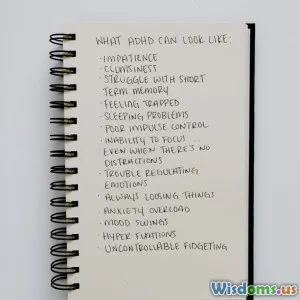
Nurturing Emotional Intelligence for Better Living
7 min read Discover how nurturing emotional intelligence transforms your life for improved relationships, decision-making, and well-being. (0 Reviews)
Nurturing Emotional Intelligence for Better Living
Emotional Intelligence (EI) is often regarded as the hidden factor that separates successful, fulfilled individuals from the rest. But what is it exactly, and why is it so crucial in our daily lives? Imagine having the ability to understand and manage your emotions effortlessly, relate well to others, and effectively navigate conflict and stress. This is the essence of emotional intelligence, a skill profoundly linked to improved relationships, workplace success, and mental well-being.
Understanding Emotional Intelligence
Emotional Intelligence, a term popularized by psychologist Daniel Goleman in the 1990s, refers to the capacity to recognize, understand, manage, and influence one's own emotions and the emotions of others. It encompasses five key components:
- Self-awareness: Recognizing and understanding your emotions as they happen.
- Self-regulation: Managing or redirecting your impulses and moods constructively.
- Motivation: Harnessing emotions to pursue goals with energy and persistence.
- Empathy: Understanding the emotions of others.
- Social skills: Managing relationships to move people in desired directions.
Research from TalentSmart, a leading EI assessment firm, shows that emotional intelligence accounts for nearly 58% of success in all types of jobs, and 90% of top performers possess high emotional intelligence.
The Impact of Emotional Intelligence on Life
Mental Health and Well-being
Emotional intelligence equips individuals with tools to cope with stressful situations, reducing anxiety and depression. For instance, the ability to identify emotional triggers and regulate responses can significantly alleviate chronic stress. Studies published in the Journal of Clinical Psychology found that individuals with higher EI demonstrated lower cortisol – the stress hormone – levels in stressful environments.
Enhancing Relationships
At its core, emotional intelligence fosters deeper empathy and communication. When you can truly understand and respond sensitively to others’ feelings, it cultivates trust and connection. For example, couples therapy experts emphasize empathy as the foundation for resolving conflicts more productively, promoting long-term relationship satisfaction.
Workplace Success
Beyond professional skills, leaders with strong emotional intelligence drive better team performance. Google’s Project Oxygen revealed that managers with high EI create more inclusive, motivated teams leading to a 20% increase in productivity. EI enables better conflict resolution, adaptability, and collaborative work environments.
Strategies to Nurture and Develop Emotional Intelligence
1. Cultivate Self-Awareness
Practicing mindfulness meditation is highly effective. It brings your focus to the present moment, allowing you to observe your emotions without judgment. Daily journaling also helps track emotional patterns, making hidden feelings more visible.
Example: A study in Psychological Science showed just 10 minutes of mindfulness exercises daily increased participants’ self-awareness and emotional regulation over eight weeks.
2. Practice Emotion Regulation
Instead of suppressing feelings, learn to acknowledge them and respond thoughtfully. Cognitive reappraisal—reframing a situation—can temper negative reactions. When faced with criticism, instead of reacting defensively, pausing to assess constructive feedback turns emotional energy into growth.
3. Build Empathy Through Active Listening
Listening truly without interrupting or forming judgments strengthens social bonds. Try reflective listening: summarizing what the other person says to confirm understanding.
Real-world insight: Therapists often use this technique to help clients feel heard, reducing emotional distress in conversations.
4. Engage in Social Skill Development
Join groups or clubs that encourage emotional sharing and feedback. Volunteer activities, for instance, immerse you in diverse perspectives, broadening empathy. Role-playing difficult conversations can prepare you to manage relationships better.
5. Seek Continuous Feedback
Solicit honest feedback from trusted friends or mentors about your emotional responses and interaction style. Constructive criticism gains invaluable self-insights and helps recalibrate emotionally intelligent behaviors.
Challenging Misconceptions About Emotional Intelligence
Some believe EI is an innate trait, fixed by genetics. However, numerous studies confirm that EI is a skillset that can be learned and enhanced over time. It’s not about suppressing emotions but skillfully managing them to enrich your life.
Another myth is that emotional intelligence is 'soft' and less important than cognitive intelligence. Contrastingly, emotional intelligence is integral to decision-making, leadership, and resilience—core elements of success both personally and professionally.
Conclusion: Embrace Emotional Intelligence for a Fulfilled Life
Nurturing emotional intelligence is an investment in your most vital asset — yourself. More than just a buzzword, EI brings tangible benefits: enriched relationships, improved mental health, stronger leadership capacities, and a general sense of well-being. As Aristotle proclaimed, "Knowing yourself is the beginning of all wisdom." By committing to develop your emotional intelligence, you embark on a path to greater self-discovery, compassion, and, ultimately, a better quality of life.
Start today by pausing to observe your emotions. Practice empathy in your next conversation. Your journey to better living through emotional intelligence can begin right now, one emotion at a time.
References
- Goleman, Daniel. Emotional Intelligence: Why It Can Matter More Than IQ. Bantam Books, 1995.
- Bradberry, Travis and Jean Greaves. Emotional Intelligence 2.0. TalentSmart, 2009.
- Salovey, Peter and John D. Mayer. "Emotional intelligence." Imagination, Cognition and Personality, 1990.
- Creswell, J.D., et al. "Mindfulness and emotion regulation." Psychological Science, 2007.
- Google Aristotle Project, Re: Emotional intelligence in leadership, 2015.
Rate the Post
User Reviews
Popular Posts





















